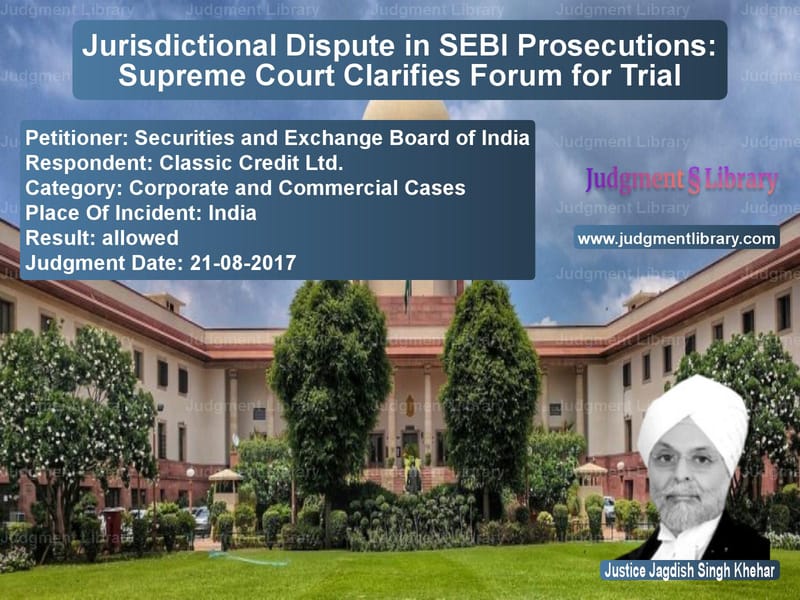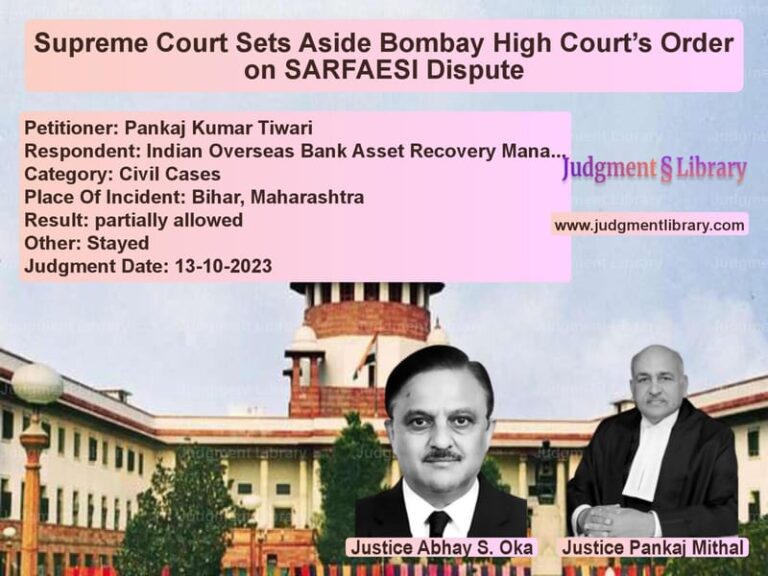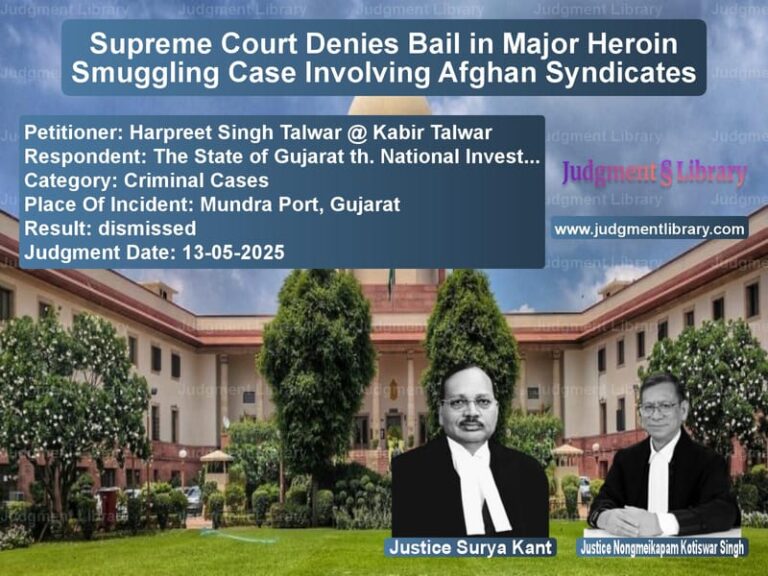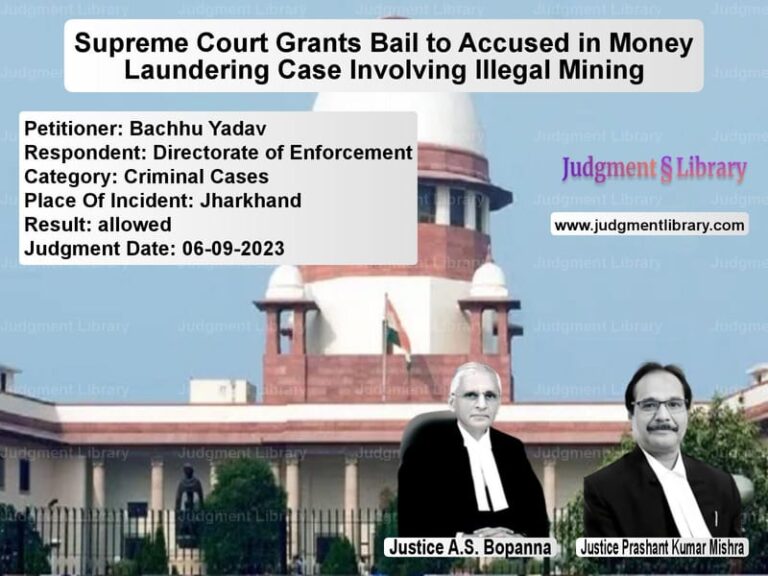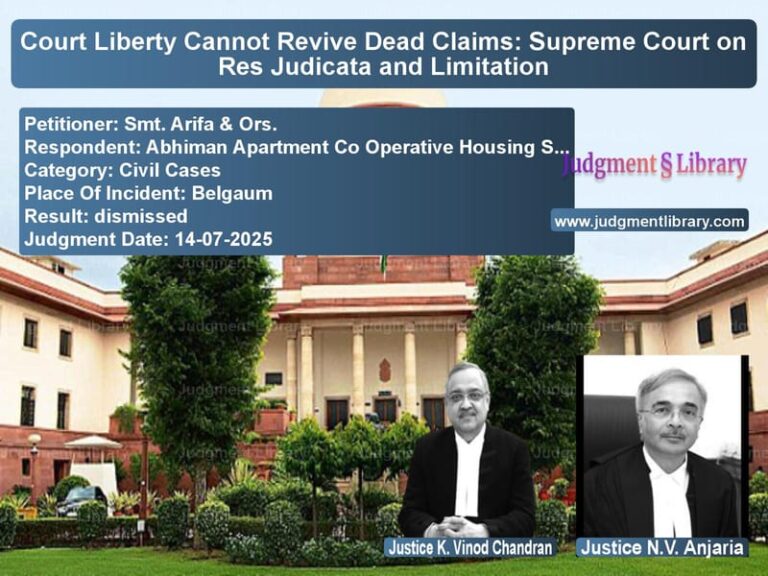Jurisdictional Dispute in SEBI Prosecutions: Supreme Court Clarifies Forum for Trial
The judgment in Securities and Exchange Board of India vs. Classic Credit Ltd. deals with a critical legal dispute regarding the forum for trial of offences under the Securities and Exchange Board of India Act, 1992 (SEBI Act). This case involved multiple appeals and writ petitions addressing whether offences committed before the amendment of the SEBI Act in 2002 should be tried in a Magistrate’s Court or a Sessions Court.
The dispute stemmed from the amendment of Section 26 of the SEBI Act, which altered the forum for trial of SEBI-related offences. The amendment raised concerns about its retrospective application and the transfer of pending cases to the newly designated court.
Background of the Case
Complaints were filed against the private parties for offences punishable under the SEBI Act. Initially, under Section 26(2) of the Act, these offences were to be tried by a Metropolitan Magistrate or a Judicial Magistrate of the first class. However, following the 2002 amendment, the jurisdiction was shifted to the Court of Session. This led to a significant legal challenge as private parties argued that offences committed before the amendment should continue to be tried in the Magistrate’s Court.
The Bombay High Court ruled that offences committed before the amendment should be tried by the Magistrate’s Court, rejecting the retrospective application of the amendment. However, SEBI contended that procedural laws, including changes in the forum for trial, should be applied retrospectively, and all pending matters should be transferred to the Sessions Court.
Arguments by the Petitioner (SEBI)
SEBI, represented by the Additional Solicitor General, argued that the amendment to Section 26 was procedural in nature and should apply retrospectively. SEBI relied on several Supreme Court precedents establishing that changes in procedural law, including changes in forum, are presumed to be retrospective unless expressly stated otherwise.
SEBI also pointed out that the amendment did not create any new offence or alter the punishment for offences under the SEBI Act. It merely changed the forum for trial from a Magistrate’s Court to a Sessions Court. The prosecution contended that a change in forum does not affect the rights of the accused and that no prejudice would be caused by transferring cases to the Sessions Court.
Arguments by the Respondent (Classic Credit Ltd.)
The respondents, represented by senior counsel, argued that the amendment could not be applied retrospectively as it would adversely impact the accused. They contended that under the unamended law, offences under the SEBI Act were considered minor and were to be tried summarily in the Magistrate’s Court. The amendment, by shifting jurisdiction to the Sessions Court, subjected the accused to a more rigorous trial process, which was not applicable when the offence was committed.
The respondents also argued that their right to a fair trial included the right to be tried in the forum prescribed at the time of the alleged offence. They contended that transferring pending cases to the Sessions Court amounted to a substantive change in the law, which could not be applied retrospectively.
Supreme Court’s Analysis and Judgment
The Supreme Court examined whether the amendment to Section 26 was merely procedural or whether it had substantive implications. The Court observed that the amendment did not create a new offence or increase the punishment but only altered the forum for trial. Referring to previous decisions, the Court reiterated that procedural changes are generally retrospective unless explicitly stated otherwise.
The Court ruled that all pending cases should be transferred to the Sessions Court, holding that:
- There was no vested right to be tried in a particular forum.
- Legislative intent was clear that all SEBI-related offences, irrespective of when they were committed, should be tried in the Sessions Court.
- Changes in forum do not cause prejudice to the accused as long as the fundamental rights to a fair trial are preserved.
Thus, the Supreme Court overruled the Bombay High Court’s decision and upheld the retrospective application of the amendment.
Key Takeaways from the Judgment
This landmark ruling clarified the retrospective application of procedural amendments and reaffirmed that a change in forum does not amount to a violation of fundamental rights. It reinforced the principle that procedural laws, including changes in the trial court’s jurisdiction, are presumed to be retrospective unless the legislature explicitly states otherwise.
The judgment also highlighted the importance of legislative intent in determining whether a law applies retrospectively. By ruling in favor of SEBI, the Court ensured uniformity in the trial process for securities law violations, emphasizing the need for specialized courts to handle complex financial crimes.
In conclusion, this case underscores the significance of procedural clarity in financial regulations and the judiciary’s role in interpreting legislative amendments to uphold justice and consistency in legal proceedings.
Don’t miss out on the full details! Download the complete judgment in PDF format below and gain valuable insights instantly!
Download Judgment: Securities and Excha vs Classic Credit Ltd. Supreme Court of India Judgment Dated 21-08-2017.pdf
Direct Downlaod Judgment: Direct downlaod this Judgment
See all petitions in Company Law
See all petitions in Corporate Compliance
See all petitions in Shareholder Disputes
See all petitions in Judgment by Jagdish Singh Khehar
See all petitions in allowed
See all petitions in supreme court of India judgments August 2017
See all petitions in 2017 judgments
See all posts in Corporate and Commercial Cases Category
See all allowed petitions in Corporate and Commercial Cases Category
See all Dismissed petitions in Corporate and Commercial Cases Category
See all partially allowed petitions in Corporate and Commercial Cases Category

